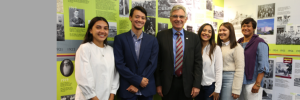
2019 Die Vlakte Bursary recipients announced
Five more students have benefited from the Stellenbosch University (SU) Die Vlakte Bursary scheme, with the announcement of the 2019 recipients this week. This brings the total value of Die Vlakte bursaries awarded to students over the past four years to R1,4 million.
Speaking at an intimate function held at the Wilcocks building on Monday, SU Rector and Vice Chancellor Prof Wim De Viliers said the bursary scheme is a form of redress for descendants of people who suffered forced removals in the 1960s from Die Vlakte.
This year's beneficiaries are Michelle Kannemeyer, a second-year BAcc (Accounting) student, Danielle Smith, second-year BA (Development and Environment), Gianni Pasquallie, first-year MBChB, Mohamed Braaf, first-year BCom (Financial Accounting) and Jaydon Rose, first-year MBChB.
In his opening address, De Villiers said Die Vlakte bursary scheme was one his highlights as the Rector and Vice Chancellor of Stellenbosch University.
“Today exactly four years ago, I started working as Rector and Vice-Chancellor. And one of the first announcements I made was that the University will be creating a bursary fund for former residents of Die Vlakte and their descendants. Why was this necessary? To right a wrong that took place in the 1960."
The Rector added that the University was working hard to become more inclusive. “Both our student and staff bodies are becoming more diverse. We are also reaching out to the community to close the gap between us.
“In October last year we paid tribute to the people of Die Vlakte when we named the building which now houses the University's Africa Open Institute for Music after the man who originally built it as a home for his family, Pieter Okkers."
Michelle Kannemeyer from Kuilsriver said she felt privileged to have been selected to receive funding from the University even though she was rejected last year when she started at Stellenbosch University. Michelle's father, Jason Kannemeyer said, “The bursary is a great financial relief to me and my family because they pay R52 000 towards my daughter's fees. It is a lot of money and we are grateful but the University could do better than this, as the bursary doesn't cover books, food and transport."
Danielle Smith from Idas Valley said it felt amazing to receive the bursary and it is a great way to help them achieve their goals.
Mohamed Hishaam Braaf said his entire family was overjoyed when they heard that he was a recipient of the bursary. “We found out on Thursday and we even had a mini celebration. It is sad that my great grandparents were moved from their land because of an Act but we celebrate today and the relief this bursary will bring to my family."
Jaydon Rose said the day had left a bittersweet taste – sweet because it was a relief and bitter because their family lost all that land.
Giovanne Pasquallie said she did not see the bursary as a handout but as part of paying homage to her forefathers to whom great injustice was done. “We are grateful because this is an opportunity for us to succeed and reach our goals."
- Die Vlakte was a neighbourhood in the area between Muller, Bird, and Joubert Streets and Merriman Avenue. The residents were mostly coloured people, and they were forcibly removed in the 1960s under the Group Areas Act. At the time, the University did not protest, and also later built on expropriated land.
A maximum of five bursaries are awarded each year to applicants who lived in the area, and their children and grandchildren. Current and prospective undergraduate students may apply, as well as applicants who will be registering for a first postgraduate programme. Applicants who are no longer living in the Stellenbosch area but who can give proof of their parents or grandparents being affected by the evictions will also be considered. Successful academic progress is a prerequisite to retain the bursary.
